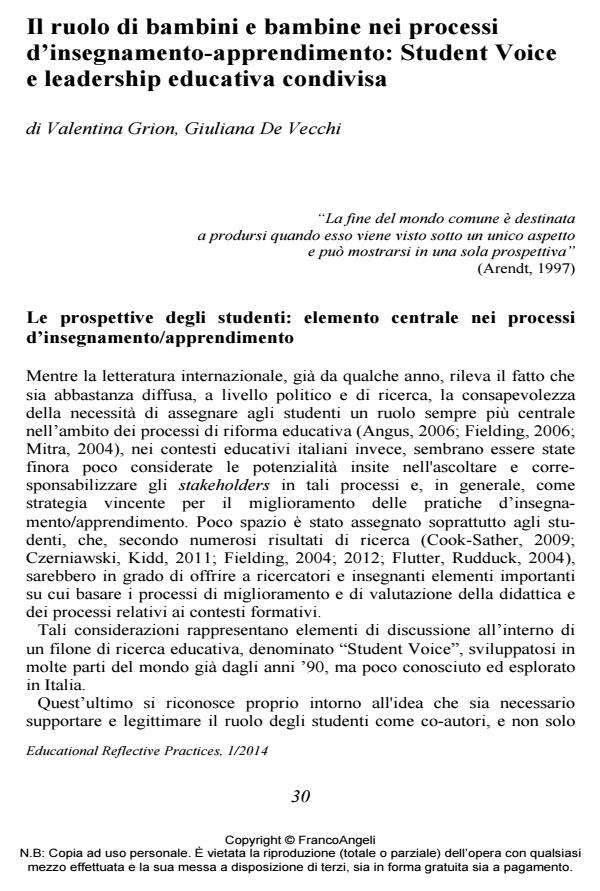Il ruolo di bambini e bambine nei processi d’insegnamento-apprendimento: Student Voice e leadership educativa condivisa
Titolo Rivista EDUCATIONAL REFLECTIVE PRACTICES
Autori/Curatori Valentina Grion, Giuliana De Vecchi
Anno di pubblicazione 2015 Fascicolo 2014/1
Lingua Italiano Numero pagine 17 P. 30-46 Dimensione file 138 KB
DOI 10.3280/ERP2014-001002
Il DOI è il codice a barre della proprietà intellettuale: per saperne di più
clicca qui
Qui sotto puoi vedere in anteprima la prima pagina di questo articolo.
Se questo articolo ti interessa, lo puoi acquistare (e scaricare in formato pdf) seguendo le facili indicazioni per acquistare il download credit. Acquista Download Credits per scaricare questo Articolo in formato PDF

FrancoAngeli è membro della Publishers International Linking Association, Inc (PILA)associazione indipendente e non profit per facilitare (attraverso i servizi tecnologici implementati da CrossRef.org) l’accesso degli studiosi ai contenuti digitali nelle pubblicazioni professionali e scientifiche
Pupils’ position in the teaching/learning processes: Student Voice and shared educational leadership In reference to "Student Voice", a still little known educational perspective in Italy, the paper opens by offering some reflections to suggest the opportunity to authorize students’ voices at school, in order to improve educational processes. It moves on to introduce some features of the cited perspective, such as those of "person centered learning community" and "shared educational leadership", very important aspects to realize a democratic school community. Having described a learning activity for primary school, the paper argues for considering this example of practice as a model realizing and supporting the theoretical points before discussed.
- Grion, V., & Grosso, M. (2012). Valutare la qualità della scuola. Centralità del punto di vista degli studenti. Italian Journal of Educational Research. Special Issue, V, pp. 157-172.
- Grion, V., & Cook-Sather, A. (Eds.) (2013). Student Voice. Prospettive internazionali e pratiche emergenti in Italia. Milano: Guerini.
- Grion, V. (2013), Partecipazione e responsabilità nelle Indicazioni Nazionali per il curricolo del primo ciclo d’istruzione. In Grion, V., & Cook-Sather, A. (Eds.),
- Student Voice. Prospettive internazionali e pratiche emergenti in Italia (pp. 136-154). Milano: Guerini.
- Mitra, D. (2004). The Significance of Students: Can Increasing "Student Voice" in Schools Lead to Gains in Youth Development?. Teachers College Record, 106 (4), pp. 651-688.
- Mercadante, L. (Eds.) (2007), Coprogettare l’apprendimento. Roma: Carocci.
- Richardson, L., & St Pierre, E.A. (2005). Writing: A method of inquiry. In Denzin N. & Lincoln Y. (Eds.). The Sage Handbook of Qualitative Research, 3rd edition (pp. 959-978). Thousand Oaks: Sage.
- Sartori, G. (2009). La democrazia in trenta lezioni. Milano: Mondadori.
- Shields, C. (2004) Dialogic leadership for social justice: Overcoming pathologies of silence. Educational Administration Quarterly, 40 (1), pp. 109–132.
- Smyth, J. (2006). Educational leadership that fosters ‘student voice’. International Journal of Leadership in Education, 9 (4), pp. 279-284.
- Wittel, A. (2001). Towards a Network Sociality. Theory, Culture and Society, 18 (6), pp. 51–76.
- Zuccoli, F. (2013). La pratica della discussione, una metodologia indispensabile per attivare la voce degli studenti. In Grion V., & Cook Sather A. (Eds.),
- Student Voice. Prospettive internazionali e pratiche emergenti in Italia (pp. 212-231). Milano: Guerini.
- Angus, L. (2006). Educational leadership and the imperative of including student voices, student interests, and students’ lives in the mainstream. International Journal of Leadership in Education, 9 (4), pp. 369–379 Arendt, H. (1997). Vita activa. Bergamo: Bompiani.
- Czerniawski, W., & Kidd, G. (2011). The Student Voice Handbook: Bridging the Academic/Practitioner Devide. Bingley, UK: Emerald.
- Ciceri, R. (Eds.) (2001). Comunicare il pensiero. Torino: Omega.
- CM/Rec (2012). Raccomandazione del Comitato dei Ministri agli Stati membri sulla partecipazione dei bambini e degli adolescenti di età inferiore ai 18 anni. Disponibile su http://www.cameraminorilepadova.it/wpcontent/uploads/2013/09/Participation_ita.pdf [Accesso 20.02.2014].
- Colinet, S., & Grion, V. (2013). School Quality. French and Italian Pupils’ Perspectives, BJSS, 1 (8), pp. 51-65.
- Cook-Sather, A. (2002). Authorizing student perspectives: Toward trust, dialog and change in education. Educational Researcher, 31 (4), pp. 3-14.
- Cook-Sather, A. (2006). “Change Based On What Students Say”: Preparing Teachers for a More Paradoxical Model of Leadership. International Journal of Leadership in Education, 9 (4) pp. 345-358.
- Cook-Sather, A. (2009). Learning from the Student Perspective. A sourcebook for effective teaching. Boulder CO: Paradigm.
- Cook-Sather, A. (2010). Students as Learners and Teachers: Taking Responsibility, Transforming Education, and Redefining Accountability. Curriculum Inquiry, 40 (4), pp. 555-575.
- De Vecchi, G. (2007). Co-autovalutazione e regolazione dei processi di apprendimento. In Mercadante, L. (Eds.), Coprogettare l’apprendimento (pp. 240- 268). Roma: Carocci.
- Fielding, M. (2001). Students as Radical Agents of Change. Journal of Educational Change, 2, pp. 123-141.
- Fielding, M. (2004). ‘New Wave’ Student Voice and the renewal of Civic Society. Review of Education, 2 (3), pp. 197-217.
- Fielding, M. (2006). Leadership, radical student engagement and the necessity of person_centred education. International Journal of Leadership in Education, 9 (4), pp. 299-313.
- Fielding, M. (2012). Beyond Student Voice: Patterns of Partnership and the Demands of Deep Democracy. Revista de Educación, 359, pp. 45-65.
- Flutter, J., & Rudduck, J. (2004). Consulting Pupils. What’s in it for schools?. Oxon: Routledge.
- Galimberti, U. (1988). I Presocratici. In E. Severino (Eds.), Filosofia. Storia del Pensiero occidentale (p. 44). Roma: Armando.
Valentina Grion, Giuliana De Vecchi, Il ruolo di bambini e bambine nei processi d’insegnamento-apprendimento: Student Voice e leadership educativa condivisa in "EDUCATIONAL REFLECTIVE PRACTICES" 1/2014, pp 30-46, DOI: 10.3280/ERP2014-001002